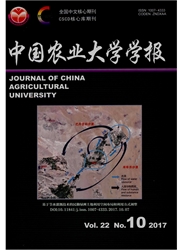

 中文摘要:
中文摘要:
为从北京鸭胃肠道中扩增血管活性肠肽(VIP)基因。根据鸡VIP基因(GenBank登录号X80906)。设计了一对简并引物,从北京鸭腺胃、十二指肠和空肠提取总RNA,通过反转录.聚合酶链反应(RT—PCR)扩增。将从腺胃、十二指肠和空肠中扩增出的产物克隆到pGEM—Teasy载体上,导入大肠杆菌JM109.阳性克隆经双酶切鉴定后测序,将测序结果与鸡和鹅(GenBank登录号为DQ023161)的VIP基因进行同源性比较。本试验扩增到的VIP基因与已知的鸡和鹅核苷酸序列比较,同源性分别为94.61%和94.42%,氮基酸序列同源性分别为93.75%和95.71%。本试验首次成功从北京鸭腺胃、十二指肠和空肠扩增到长度为240bp、编码VIP的基因片断(已提交GenBank,登录号DQ200173)。
 英文摘要:
英文摘要:
In order to clone the VIP gene in the gastrointestinal tract from beijing duck, one pair of specific primers to VlP gene was designed and synthesized according to the chick sequence (X80906). Encoding VIP cDNA fragments were amplified by RT-PCR from the total RNA in the Proventriculus, the Duodenum and the Jejunum of Beijing duck. Their PCR products were ligated into pGEM-T easy vector, which was transformed into E. coli JM109. Positive bacteria clones were screened and identified by PCR method and digested with the double restriction enzyme EcoR Ⅰ. The sequence of VlP gene fragment was also determined and analyzed. Compared with the chick and the goose (DQ023161) VlP, the homology of the clone Beijing duck VIP was 94.61 and 94.42% and that of the deduced amino acid sequence was 93.75 and 95.71%, respectively. This is the first time the VlP gene fragment(DQ200173)is analysed in the three tissues from Beijing duck.
 同期刊论文项目
同期刊论文项目
 同项目期刊论文
同项目期刊论文
 期刊信息
期刊信息
